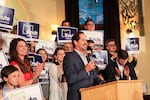The first public poll in Oregon’s gubernatorial race in six months is certainly eye-catching. It shows Gov. Kate Brown and Republican challenger Knute Buehler tied at 45 percent apiece.
What’s not clear is just how accurate the survey is, or the motivations of the Florida-based firm that is behind it, Gravis Marketing.

Oregon state Rep. Knute Buehler speaks to supporters after winning the Republican primary to challenge Kate Brown for the governor’s seat.
Allison Frost / OPB
The July 16-17 survey of 770 likely voters also found voters almost evenly divided over a November ballot measure that would overturn Oregon's sanctuary law, which limits state and local law enforcement cooperation with federal immigration authorities. However, more than 20 percent of voters say they are undecided about the initiative, which was qualified for the ballot last week.
In the governor’s race, Brown has been seen as the strong front-runner by several political forecasting groups, at least in part because Democrats hold all but one statewide elected office in Oregon. But there’s been little in the way of hard data that’s been made public about the state of the race.
The last public poll, conducted in January for Oregon Public Broadcasting by DHM Research of Portland, found Brown with a 17-point lead — 46 percent to 29 percent — over Buehler.
John Horvick, vice president and political director for DHM, said that private data he’s seen shows that the race has tightened considerably.
The Gravis poll “is directionally correct, I think,” said Horvick, adding that he still believes Brown has a small cushion.
Related: Buehler's Platform Builds On Health Care Reform
Horvick said it would make sense that the race would tighten as Buehler, a state representative from Bend, becomes more well-known. The Republican candidate also spent more than a million dollars in advertising in the primary, most of it including criticism of Brown. The governor had little primary opposition and instead continued to save her money for the general election.
The Gravis poll did raise some methodological questions. The firm says it used “an online panel of cellphone users and interactive voice responses.” The latter phrase means that many respondents were questioned by an automated voice and used touch-tone buttons to list their choices. Some polling experts raise doubts about the accuracy of those kinds of polls.
In addition, Horvick noted that the poll doesn’t draw from lists of registered voters. Instead, voters are asked to self-identify, which Horvick said makes them more likely to describe themselves as an independent.
As a result, 44 percent of the sample identified themselves as an independent. In reality, a much higher share of the electorate will be made up of voters registered as Republican or Democrat. And Horvick said there’s no way to know if Gravis got the right mix of Democratic and Republican voters.
Gravis founder Douglas Kaplan couldn’t be reached for comment Monday.
His firm has received a C+ rating from FiveThirtyEight.Com, a well-known politics website that regularly rates pollsters.
Related: Gov. Kate Brown Calls On Democrat Nathan Boddie To Withdraw Candidacy
The firm has had some notable failures since it started in 2010. The Washington Post reported that in 2016, Gravis said a primary challenger to a Republican congressman in Maryland was leading by 29 points. Months later, that challenger lost by 76 points.
In 2014, the firm said Texas Sen. John Cornyn was ahead of his primary challenger by 15 points. But Cornyn ended up winning by 40 points.
Gravis said in the polling memo it released this weekend that it paid for the Oregon gubernatorial poll on its own. It said the poll has a margin of error of 3.5 percentage points.
Buehler’s spokeswoman, Monica Wroblewski, alerted at least one journalist by email to the poll. But she told OPB that the campaign wouldn’t have any comment on the survey.
Brown’s campaign spokesman, Christian Gaston, questioned Gravis’ credibility. He declined to comment on what his campaign’s own polls show about the state of the race.